“Are Pink Mimosa Flowers Edible?” - Exploring The Interesting Facts
“Are pink mimosa flowers edible?” may be a popular question for those who are concerned about this plant. The mimosa tree or Persian silk tree, scientifically known as Albizia julibrissin, is a popular ornamental tree appreciated for its beautiful pink flowers and delicate foliage. While the tree itself is generally considered safe, it's essential to understand the potential toxicity associated with certain parts of the tree. In this article, we will explore the safety of the mimosa tree, highlighting its non-toxic nature while cautioning against the ingestion of specific parts and addressing potential allergic reactions.
Flowers Edible?” - Exploring The Interesting Facts" src="https://cdn.shopify.com/s/files/1/0154/3713/5926/files/Are_pink_mimosa_flowers_edible_2_480x480.png?v=1684292009">
“Are Pink Mimosa Flowers Edible?” - Exploring The Interesting Facts
1. Are Pink Mimosa Flowers Edible?2. Amazing Benefits Of Pink Mimosa
1. Are Pink Mimosa Flowers Edible?
Pink mimosa flowers are generally considered edible. However, it's important to note that while the flowers are not toxic, they may not be particularly palatable for consumption.
Pink mimosa flowers are often used as a decorative element in various dishes, such as salads or desserts, to add a touch of color. They have a mild, slightly sweet taste but are not commonly consumed as a standalone food item.
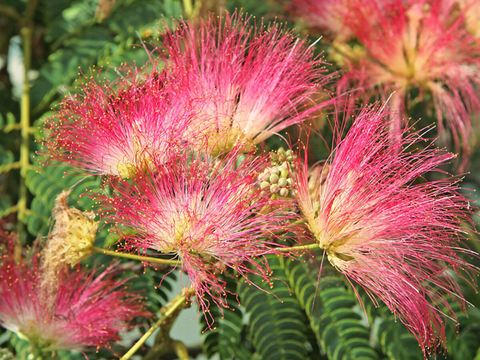
If you plan to use pink mimosa flowers in culinary preparations, it's crucial to ensure that they are free from pesticides or other chemicals. If you are uncertain about the source or safety of the flowers, it's best to avoid eating them.
As with any plant material you're considering for consumption, it's advisable to do thorough research and consult reliable sources or experts to ensure that you are making an informed decision.
2. Amazing Benefits Of Pink Mimosa
Pink mimosa offers several potential benefits. While scientific research on the specific benefits of this tree is limited, it is traditionally used in various cultures for its medicinal properties. Here are some potential benefits associated with pink mimosa:
2.1 Relaxation and Mood Enhancement
Pink mimosa has been traditionally used in herbal medicine to promote relaxation and uplift the mood. It is believed to have mild sedative and anti-anxiety properties, helping to reduce stress and promote a sense of calmness.

2.2 Memory Loss Improvement
Studies have suggested that certain compounds present in Albizia julibrissin extracts may exhibit neuroprotective properties and enhance cognitive function. These properties make Albizia julibrissin a subject of interest in the field of natural remedies for memory-related conditions. However, further research is needed to fully understand its mechanisms of action and its potential application in memory improvement.
2.3 Antioxidant Properties
Mimosa silk tree contains various phytochemicals, including flavonoids and phenolics, which possess antioxidant properties. Antioxidants help protect the body against damage caused by harmful free radicals, reducing the risk of chronic diseases and promoting overall health.

2.4 Anti-inflammatory Effects
Some studies suggest that pink mimosa may have anti-inflammatory properties. It may help reduce inflammation and associated symptoms, such as pain and swelling. However, further research is needed to understand the specific mechanisms and potential applications.
2.5 Anti-tumor Properties
Research suggests that extracts from Albizia julibrissin may exhibit anti-cancer effects by inhibiting tumor growth, inducing cell death in cancer cells, and suppressing cancer cell migration and invasion. These effects are attributed to the presence of various bioactive compounds, including flavonoids and saponins, which possess antioxidant and anti-inflammatory properties.
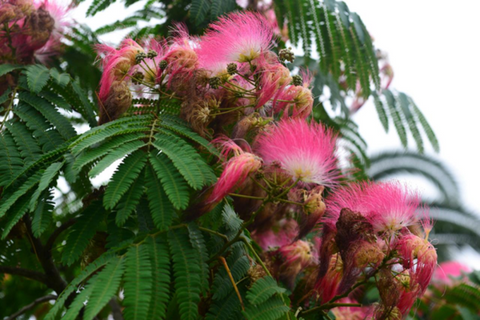
While promising, further studies, including preclinical and clinical trials, are necessary to determine the full potential of Albizia julibrissin as an anti-tumor agent and its specific mechanisms of action.
3. Side effect Of Pink Mimosa
While pink mimosa (Albizia julibrissin) is generally considered safe for consumption and use, it's important to be aware of potential side effects or allergic reactions that some individuals may experience. Here are a few considerations:
3.1 Allergic Reactions
Some individuals may be allergic to pink mimosa or its components. Allergic reactions can manifest as skin rashes, itching, hives, or respiratory symptoms such as difficulty breathing or wheezing. If you have known allergies or sensitivities to plants in the Fabaceae family (such as peanuts or soy), it's advisable to exercise caution when using or consuming pink mimosa.

3.2 Gastrointestinal Issues
In rare cases, consuming pink mimosa flowers or extracts may cause gastrointestinal discomfort, including stomach upset, bloating, or diarrhea. If you experience any digestive issues after consuming this kind of plant, it's recommended to discontinue use and consult a healthcare professional.
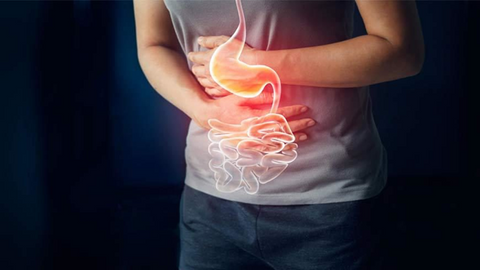
3.3 Drug Interactions
Pink mimosa may interact with certain medications. If you are taking any prescription drugs, especially sedatives, anti-anxiety medications, or antidepressants, it's important to consult with a healthcare professional before using pink mimosa to avoid potential interactions or adverse effects.

3.4 Pregnancy and Breastfeeding
There is limited scientific information available on the safety of pink mimosa during pregnancy and breastfeeding. To ensure the well-being of both the mother and baby, pregnant or breastfeeding women should avoid using this herb unless specifically recommended and supervised by a qualified healthcare professional.

It's essential to remember that individual responses and sensitivities can vary, and it's always a good idea to exercise caution when trying new herbs or supplements. If you experience any adverse reactions or have concerns about using pink mimosa, it's best to consult with a healthcare professional for personalized advice.
4. FAQ about Pink Mimosa
4.1 Is mimosa tree toxic?
No, the mimosa tree is not considered highly toxic. However, the seeds and pods of the tree contain a compound that can be toxic if ingested in large quantities. It's best to avoid consuming these parts, and contact with the tree may cause skin irritation or allergic reactions in some individuals.
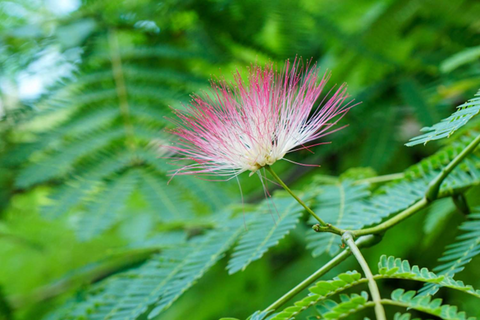
4.2 What does pink mimosa look like?
Pink mimosa is a deciduous tree with feathery, fern-like leaves that are green in color. It produces showy, fragrant pink flowers arranged in clusters. The flowers have long, thread-like stamens that give them a distinctive appearance.
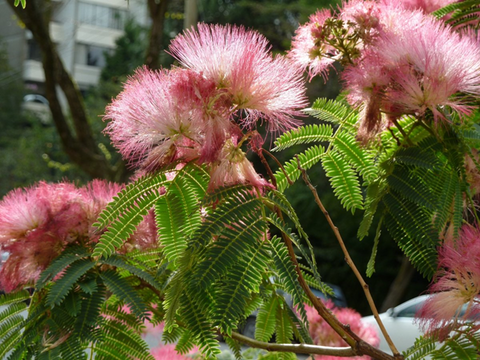
4.3 Can pink mimosa be grown in home gardens?
Yes, pink mimosa can be cultivated in home gardens in suitable climates. It requires a sunny location and well-drained soil. However, it is important to check with local gardening resources to ensure it is not considered invasive in your area. You can also discover how to grow it here!
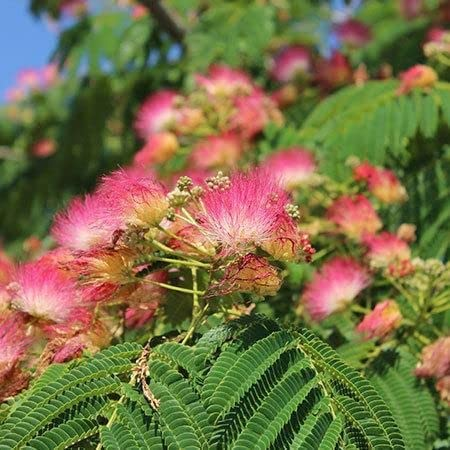
If you are seeking premium seeds to grow, you also can consider choosing the pink mimosa seeds from The Rike supplier. We are committed to providing high-quality seeds for your garden. Discover here!
5. Conclusion
We trust that this information has provided you with the necessary guidance regarding your question: "Are pink mimosa flowers edible?". In summary, the pink mimosa tree is generally safe, but caution is advised regarding the ingestion of its seeds and pods. Additionally, some individuals may have allergic reactions to the tree's leaves and flowers. Being aware of these potential risks allows for a safe and enjoyable experience with the mimosa tree.





Leave a comment